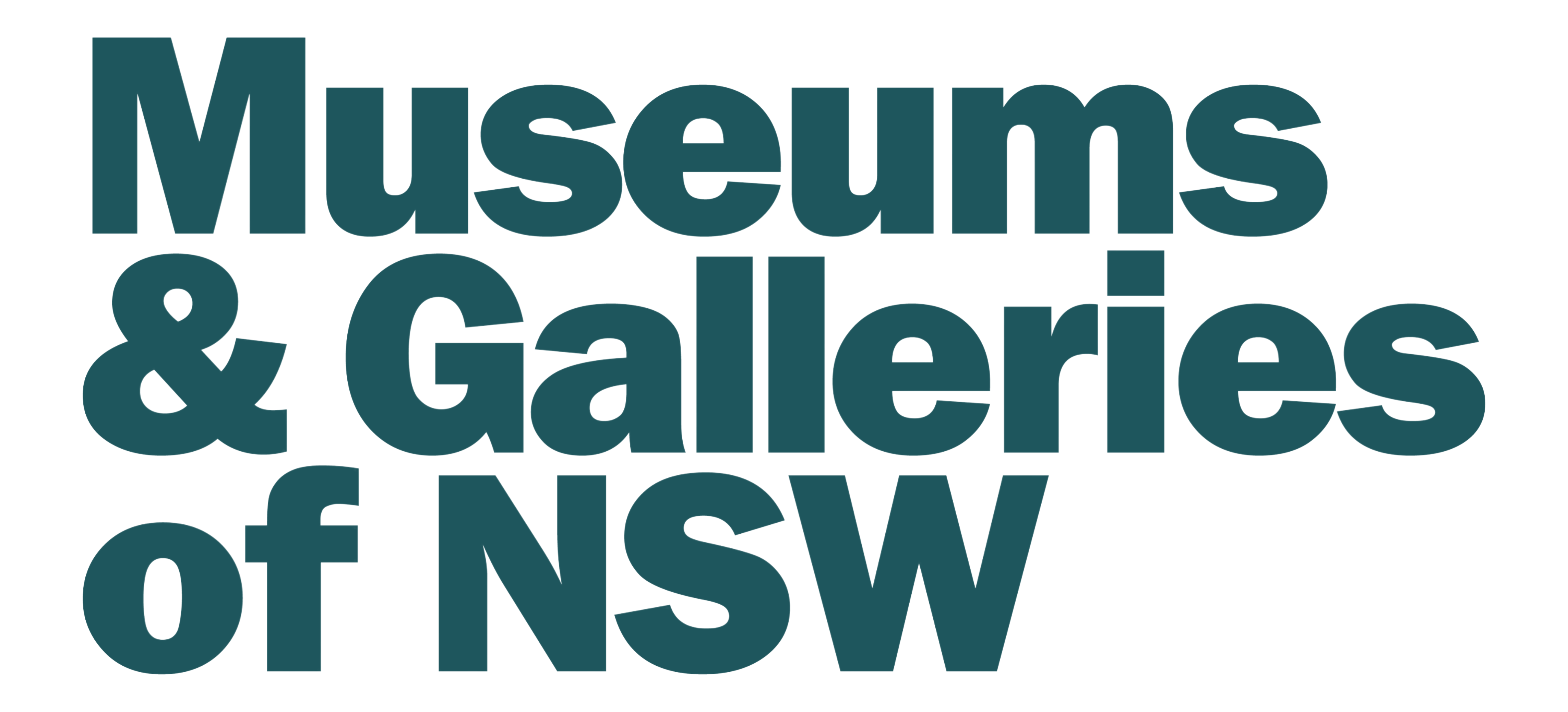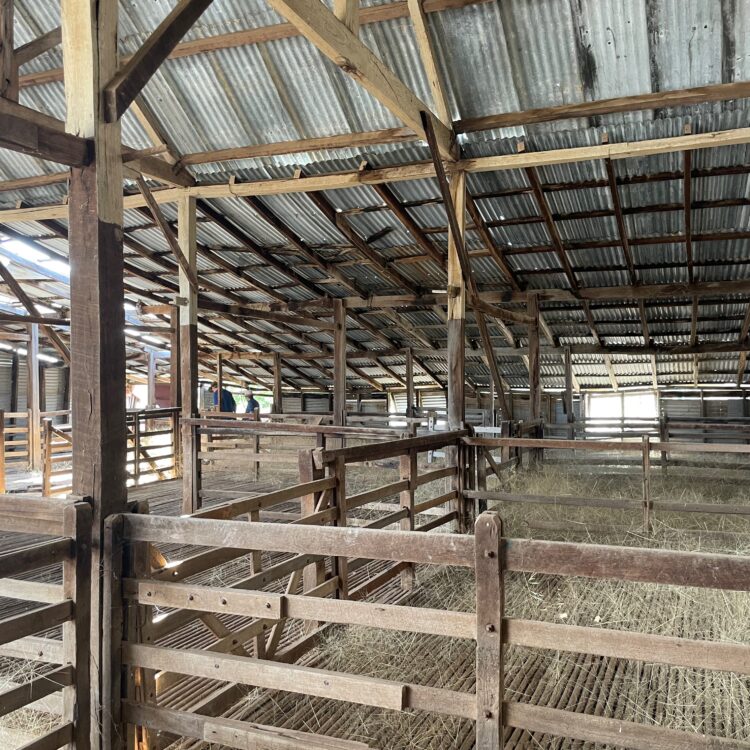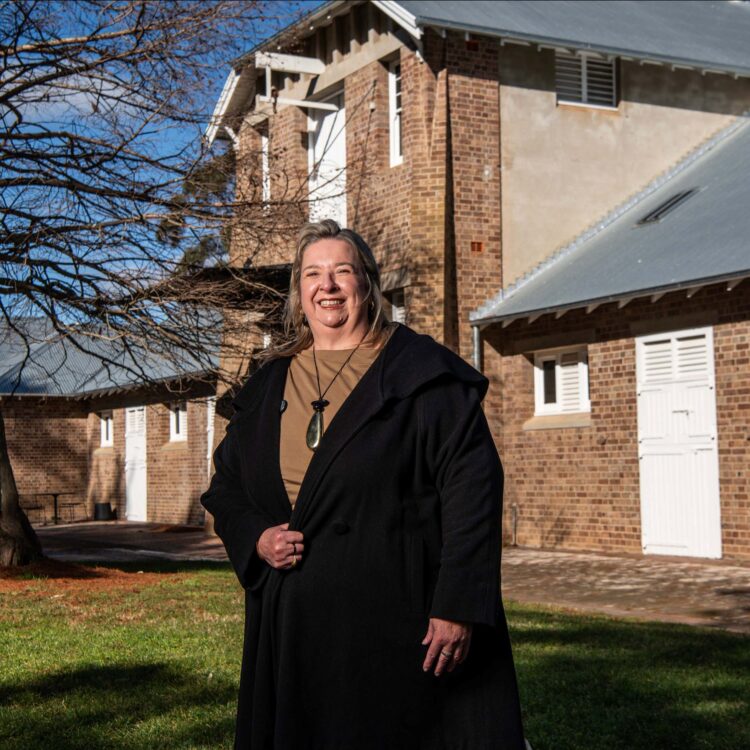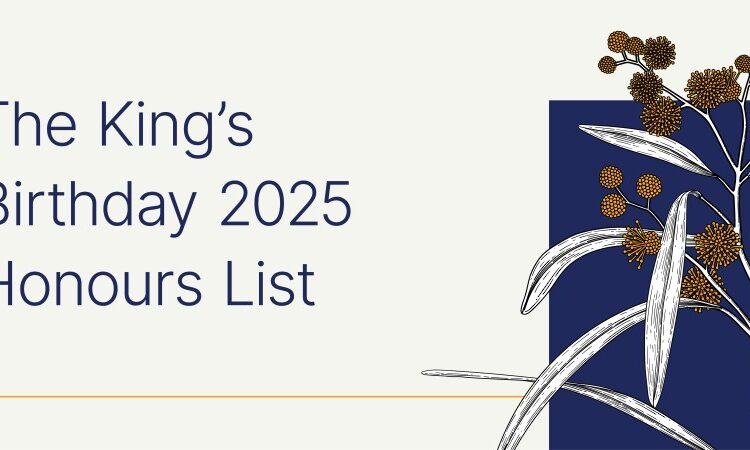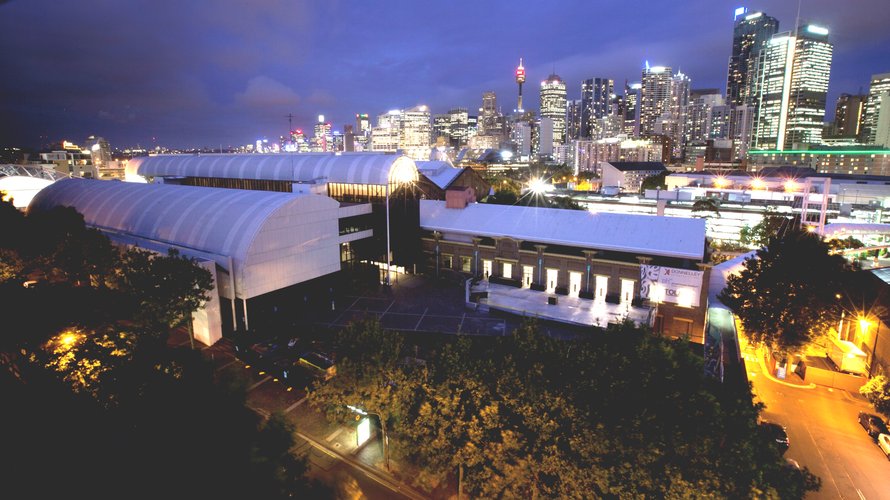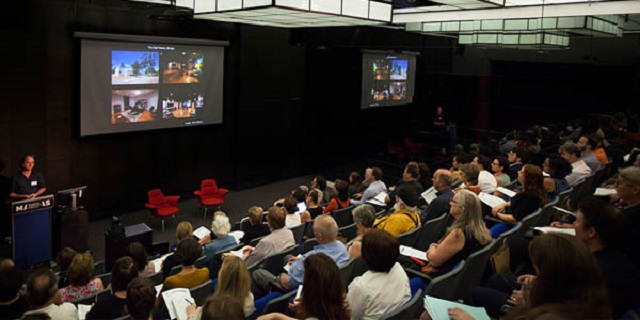
This annual forum is an opportunity for the regional museums and collections sector to get together, discuss current topics and be inspired by new ideas. The forum will bring attendees up-to-date on issues affecting regional museums, collecting organisations and cultural institutions and is designed for:
- volunteers of regional museums and galleries
- regional arts development officers and museum advisors
- programs producers at cultural institutions or collecting organisations
- regional cultural sector advisors and professionals
10 November 2017, 9am–3pm
Free, bookings are essential
Kim Biggs
Museum Advisor for the Bland, Lockhart, Narrandera Albury and Greater Hume Local Government Areas
Kim’s background is in museums, tourism and community cultural development within a regional setting. She relies on and enjoys a partnership approach to projects with an emphasis on cross-community consultation. Her particular expertise lies in strategic planning, policy development and project management with an interest in working with community museums to address issues of sustainability. Having spent time living and working in regional areas means she has a realistic approach to working with small and medium size volunteer-run museums.
‘From little things big things grow’
From quirky domestic theming to holographic storytellers, this presentation follows two creative interpretation projects in the Albury and Greater Hume region. It’s all about thinking laterally, making the most of your assets, stretching the dollars, collaborating and making connections. Both projects have attracted new volunteers, new partners and new audiences by using old and new technology. Come along and hear the secrets of our success.
Marcus Hughes
Head of Indigenous Engagement & Strategy
Marcus has worked within the arts and cultural sector throughout Australia and the UK as a producer, presenter and advocate across all artistic disciplines, contexts and environments. In 2014 he addressed the 6th World Summit on Arts and Culture, and was Adjunct Associate Professor at Victoria University’s Moondani Balluk Indigenous Academic Unit. Marcus is a descendant of the Mununjali peoples of the Yugambeh nation.
‘Getting grounded/staying grounded’
In May 2017 the Museum of Applied Arts & Sciences launched its Australian Indigenous Cultural and Intellectual Property (ICIP) Protocol and its first Reconciliation Action Plan. These two documents articulate the institution’s intent and form the framework for its relationship with Australia’s First Peoples. In this session Marcus Hughes will talk you through the process that consolidated its cultural grounding and has established MAAS as a leader in the field of reconciliatory museological practice.
Margôt Jolly
Museum Consultant
Margôt worked for the Historic Houses Trust of NSW (Sydney Living Museums) for ten years, as an Assistant Collection Manager and a curator at Rouse Hill House & Farm. In the years since leaving the HHT she has worked as a Museums Advisor with Museums & Galleries NSW; Assistant Manager Heritage at Old Parliament House; Project Officer for the Sustainable Collection Project in the Central West, and as a museum consultant for small regional museums all over the State.
‘Great collection management in small museums’
The presentation will cover basic useful information for setting up a clear, useable collection management system for a small museum, where you may or may not be blessed with tech nerds and up-to-date hardware and software. The presentation will cover best practice museum standards possible for all and include good cataloguing tools and how good organisational and ethical governance forms the basis for great ethical collection management.
Meg Keneally
Author
Meg Keneally is the co-author with Tom Keneally of The Monsarrat Series, crime fiction set in colonial New South Wales. Her first solo novel, Fled, based on the extraordinary escape of First Fleet convict Mary Bryant, will be out next year. After many years as a journalist, Meg now also works in corporate affairs and doubles as a part-time SCUBA instructor.
‘Stranger than fiction: the role of museums in bringing the past to life’
Researching historical fiction means looking beyond names and dates – writers and readers want to know how people thought, what challenges they faced, what they ate, wore, saw and smelled. Museums have a massive role in bringing the past to life, and collaborating with others in the community to get the story of our history out – and they are often the custodians of stories which truly are stranger than fiction.
Peter Kierath
Chairman, Narromine Aviation Museum
Peter was Chairman for 5 years during the fund raising, construction and establishment of the new Narromine Aviation Museum. He has been a committee member since the mid 1990’s. Before retiring Peter was a Councilor, worked in retail and on several local committees. Peter spends many hours each week developing and promoting the Narromine Aviation Museum.
‘Too damned far out west: developing Narromine Aviation Museum’
The story of Narromine’s historic aerodrome was gradually fading from memory. In the mid 1990’s a few interested people decided to form a committee to address this problem. Where to start, what to do and who to do it? We were all rank but enthusiastic amateurs.A building plan was drawn up, a story developed and funding investigated. The Museum was opened in 2002 by Nancy Bird Walton – what a relief! But that was only the end of the beginning!
Tamara Lavrencic
Museum Programs and Collections Manager, Museums & Galleries NSW
Tamara is responsible for developing and coordinating museum programs to support sustainability, including grants for professional development and collection related projects, Standards for Sustainable Community Museums and the Museum Advisor Program. She provides advice on a broad range of issues such as museum management, community engagement and collections management. Tamara is a member of the Standards Review Committee and a Standards Reviewer. She is an accredited and experienced conservator.
Pip McNaught
Curator, Research Centre Associate, National Museum of Australia
Pip is a curator who has worked at the National Museum of Australia (NMA) and volunteer run museums. She has a long involvement in museum related volunteer projects and committees including Museums Australia, Working Spaces, and a reviewer for Museums & Galleries NSW Standards Program. She is currently an Associate at the Research Centre at the NMA realizing projects in aged care centres.
‘Important to me: a curatorial community collaboration’
This presentation focuses on the benefits of programs that work with collections to enhance aged care. Important to me began as a small ‘museum’ project in an aged care centre, documenting the history, provenance and significance of personal objects chosen by residents. The annual exhibition, held in the centre, promoted networking, friendship and community collaboration. In 2017, a grant enabled the publishing of 23 stories from residents in three aged care centres.
Janelle Middleton
Museums Manager, Bathurst Regional Council
Janelle has recently landed her dream job as Museums Manager, Bathurst Regional Council. She oversees the operations of three museums covering the diverse stories of a train driving Prime Minister, Australian racing cars, amazing fossils and minerals, and an even more amazing T-rex. She is currently project managing the development of the new Bathurst Rail Museum. Janelle’s career has taken her from high school art teaching through to local government working in community development and her current role.
‘Flexibility in design: Bathurst Rail Museum’
Bathurst Rail Museum is being designed at a time where museums are required to move beyond their traditional roles and use of space to increase visitation and ensure sustainability. This presentation will describe the process in developing a new flexible museum space. It will also touch upon creative uses of existing museum spaces operated by Bathurst Regional Council.
Jackie Randles
Manager Inspiring Australia NSW
Jackie Randles manages the NSW program for Inspiring Australia, the national strategy for community engagement with science, technology and innovation. She works with community groups, universities, scientists, artists, museums and business leaders to build bigger audiences for scientists and engineers, promoting the relevance of their work to everyday life and inspiring the next generation of innovators.
‘The sweet spot: essential ingredients for successful collaboration’
Jackie Randles works with hundreds of organisations across NSW that deliver regular science engagement programs in their communities. Dozens of organisations collaborate as Regional Science Hubs and hundreds more are bringing scientists and technologists into their programming with great results. Jackie will discuss the origins, opportunities and pitfalls of successful projects she’s cofounded including Neural Knitworks: craft a healthy brain, a neuroscience awareness project based on yarn craft that has now gone global, Curious Science, a model for monthly research talks held at City of Sydney Library that is expanding to the regions and Sydney Science Festival, created in 2015 to extend the reach of National Science Week in Sydney.
Elizabeth Rogers
Chief Executive Officer, Regional Arts NSW
Elizabeth joined Regional Art NSW as the Chief Executive Officer in December, 2006. Since that time she has developed and implemented a new strategic direction for the organization, focusing on its role as a peak body and service agency for arts and cultural development across rural and regional areas of the state. She works closely with the state-wide network of 14 regional arts development organisations and acts as an advocate for the network with the state and federal governments.
Deborah Vaughan
Regional Program Producer, Museum of Applied Arts & Sciences.
Deborah has been Regional Program Producer at MAAS since 2014. From 2011-2014 she was Producer of Contemporary Programs, working on Sydney Design Festival. Deborah has a background in visual art and for many years balanced a full time art practice with teaching in the Faculty of Architecture, Design and Planning at The University of Sydney. From 2003-04 Deborah was Australian Museums and Galleries Online (AMOL) National Guide and Education Coordinator.
Sally Watterson
Senior Policy Officer, Arts and Culture LGNSW
Sally has been Senior Policy Officer, Arts and Culture for LGNSW since mid-2015. Prior to this, she has worked across various roles in museums, art galleries, historic sites and national parks. Sally has extensive experience in strategic planning, policy development, project management and in securing state, local government, federal and international funding. She has also lectured at the University of Sydney. Sally has PhD in Museology and holds a Graduate Diploma in Heritage Studies and Bachelor of Arts in Art History.
‘Communities and culture: the NSW local government arts and culture landscape’
Communities and Culture is a research project undertaken by Local Government NSW during 2015/16. The recently released report identifies how councils deliver arts, culture and heritage services. Findings of the research highlight that existing quantitative data vastly under-represents the actual commitment of councils in NSW. The focus of the research was to develop baseline documentation identifying what activities councils deliver and how they deliver them, not how much councils own or spend. The Report also paints an evidence based snapshot of the complex nature of arts and culture service delivery in NSW. This presentation with discuss key findings and issues raised by this unique research project
Peter Wood
Executive Director, Arts Northern River
Peter has worked for over 25 years in the arts and creative industries in Australia and the UK, including posts with Sydney Opera House, Company B Belvoir and Assembly -Edinburgh. In 2013 he was appointed Executive Director for Arts Northern Rivers. His recent work for the company includes a place-making project If These Halls Could Talk that saw community halls activated by renowned artistic teams, which has resonated with local, national and international audiences.
‘If these halls could talk’
A presentation of a unique regional place-making project called If These Halls Could Talk. The project aimed to empower communities to re-engage with their community hall, to raise the roof and discover what’s inside, to listen and then to follow the history and document the unique narrative of their hall and the community that surrounds it. Developed in partnership with renowned artistic teams, regional galleries, ABC North Coast and regional historical societies and museums.
